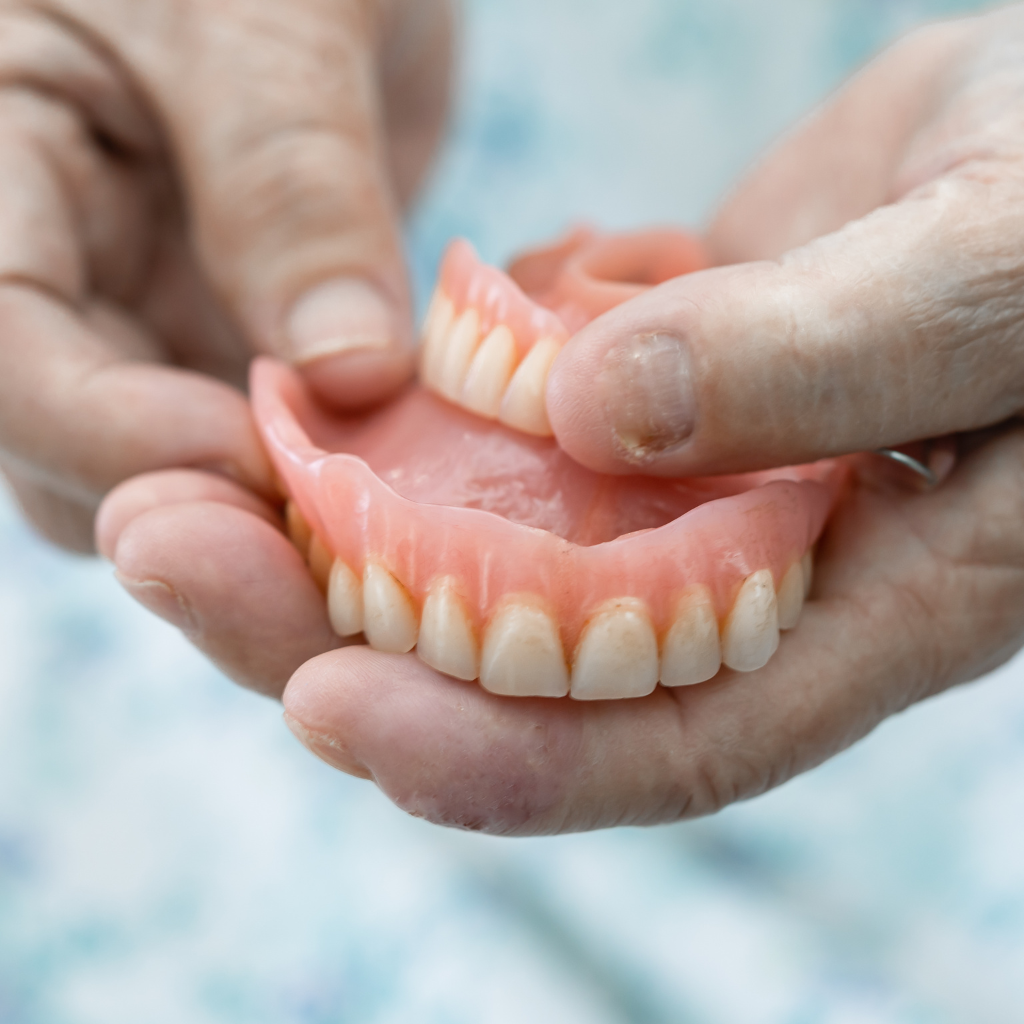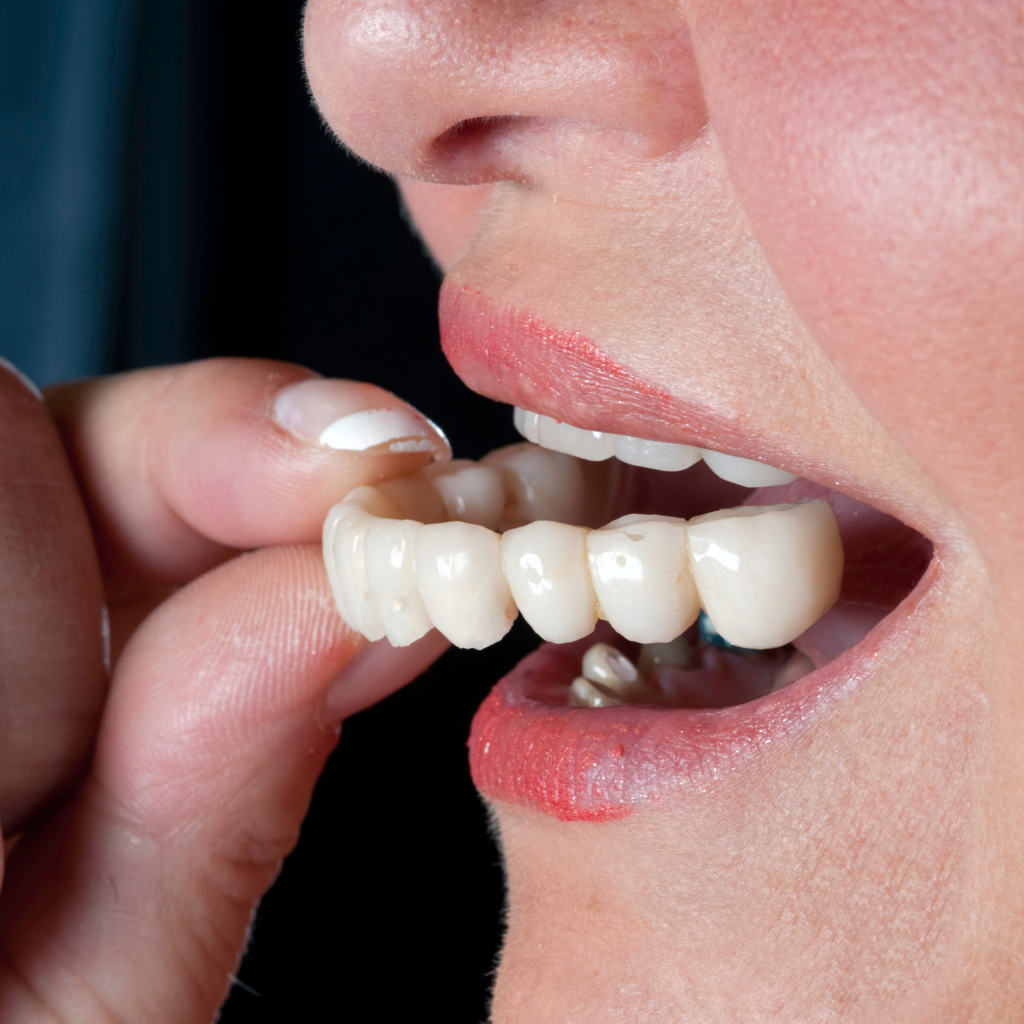Choosing the right type of denture is an important step toward restoring both the function and appearance of your smile. As a common solution for tooth replacement, dentures come in various forms—from full and partial dentures to implant-supported options. Understanding these different types can help you make an informed decision that suits your specific dental needs. This guide explains the available denture options, their benefits, and who they’re best suited for, helping you choose the most effective and comfortable solution for tooth replacement and long-term oral health.
Key Takeaways
- Complete dentures replace all teeth, enhancing oral functionality and smile aesthetics.
- Partial dentures integrate with existing teeth, offering a cost-effective and aesthetic solution.
- Implant-supported dentures provide stability and a natural appearance by anchoring to dental implants.
- Custom dentures are tailored for individual fit, ensuring optimal functionality and aesthetics.
- Economy dentures offer affordability but may lack customization and comfort.
What Are the Different Types of Dentures Available?
In the domain of dental prosthetics, patients have access to various denture types designed to suit specific clinical needs and oral health conditions.
Complete dentures provide a full arch replacement for patients with total tooth loss, while implant-supported dentures offer enhanced stability and functionality.
Partial dentures cater to individuals with several missing teeth, seamlessly integrating with existing dentition to restore aesthetics and function.
Understanding Complete Dentures
Complete dentures are a fundamental solution for individuals who have lost all their natural teeth due to various reasons, such as decay, injury, or periodontal disease.
These full dentures, also known as traditional dentures, serve as removable prosthetic devices designed to replace missing teeth. Dentures are removable, offering patients the convenience of easy maintenance and adjustment.
These prosthetic devices are custom-made to fit the patient’s oral structure, ensuring both functionality and aesthetics. Dentures can be made from different materials, tailored to the specific needs and preferences of the patient.
Their primary function is to restore oral functionality and enhance the patient’s smile. By providing replacement teeth, complete dentures play an essential role in improving the overall quality of life for individuals with complete tooth loss.
An Overview of Implant-Supported Dentures
While traditional dentures provide a removable solution for tooth loss, implant-supported dentures offer a more stable and permanent alternative. These dentures are anchored by dental implants, replacing missing teeth with a solution that mimics natural teeth in function and appearance.
Implant-supported dentures are more secure than traditional dentures, reducing the risk of slippage and enhancing comfort. They are similar to complete dentures but consist of replacement teeth affixed to dental implants. This makes them a good solution for patients seeking permanent dentures.
The types of dentures and cost vary, with implant-supported options generally being more expensive due to the surgical procedure required. However, the long-term benefits, such as improved oral health and functionality, justify the investment for many patients.
The Role of Partial Dentures for Missing Teeth
For individuals missing one or several teeth, partial dentures present a viable restorative option that bridges the gap between removable and fixed prosthetics.
These appliances are designed to work in conjunction with remaining natural teeth, providing both aesthetic and functional benefits. Removable partial dentures are used when some teeth are missing, offering a cost-effective solution compared to other prosthetic options.
Key considerations for selecting the best type of dentures include:
- Design: Dentures are designed to fit seamlessly with existing teeth.
- Material: Flexible partial dentures offer comfort and adapt to the mouth’s movements.
- Cost: Partial dentures are a cost-effective alternative, reducing the financial burden.
- Durability: Proper care guarantees longevity and sustained functionality.
Ultimately, partial dentures enhance oral health and restore confident smiles.

How to Choose the Best Type of Denture for You?
Selecting the most suitable type of denture requires careful evaluation of individual patient needs, oral anatomy, and lifestyle preferences.
Considerations such as cost, maintenance requirements, and the level of stability desired play critical roles in deciding between traditional removable dentures and permanent fixed options like implant-supported dentures.
A thorough comparison of these denture types, including their advantages and limitations, can guide patients toward an informed choice that best aligns with their overall oral health goals.
Factors to Consider When Choosing a Denture
Maneuvering the multitude of factors involved in choosing the right type of denture can be complex, yet essential for patient satisfaction and oral health.
Key considerations include:
- Patient’s Oral Health Needs: Evaluate whether complete or partial dentures, immediate denture solutions, or implant-supported dentures best suit the patient’s dental condition.
- Material and Comfort: Consider flexible dentures for enhanced comfort or economy dentures for cost-effectiveness.
- Lifestyle and Aesthetic Preferences: Snap-in dentures offer security and aesthetics, while flexible options provide a discreet appearance.
- Budgetary Constraints: Assess affordability in relation to the patient’s financial capabilities, balancing cost with quality and durability.
Choosing the right type of denture involves understanding various options, including different types of dentures, and aligning them with individualized patient needs and circumstances.
Comparing Traditional Dentures and Permanent Dentures
When considering tooth replacement solutions, understanding the differences between traditional dentures and permanent dentures is essential to making an informed decision.
Traditional dentures, also known as conventional dentures, are removable prosthetics designed to replace all your teeth. These dentures are generally made from acrylic or metal, offering ease of use and affordability.
In contrast, permanent dentures, often referred to as implant-supported dentures, involve a surgical procedure where implants anchor the denture in place. This type of denture provides enhanced stability and comfort.
Both types of dentures are used to replace missing teeth, yet the benefits of dentures vary. While traditional options offer flexibility, permanent versions provide a more natural feel. Evaluating different types of dentures can guide the best patient-specific choices.
What Are the Benefits of Dentures?
Dentures serve as a practical solution for replacing missing teeth, effectively restoring oral functionality and aesthetics.
They play an essential role in maintaining dental health by preventing the shifting of existing teeth and supporting facial structures.
Furthermore, dentures greatly enhance quality of life by improving speech, chewing ability, and overall confidence.
How Dentures Replace Missing Teeth Effectively
Although tooth loss can pose significant challenges to oral health and aesthetics, dentures provide an effective solution for replacing missing teeth.
Dentures come in different types, offering flexibility in dental rehabilitation. When considering dentures, understanding the available options is essential for selecting the right type of denture. Custom dentures may be crafted to fit the specific anatomy of a patient’s mouth, ensuring comfort and functionality.
A patient-focused approach involves:
- Assessment: Evaluating the oral cavity to determine the most suitable denture type.
- Customization: Designing dentures that align with the patient’s unique dental structure.
- Adaptation: Ensuring the dentures fit properly and maintaining stability during use.
- Maintenance: Educating on daily care to prolong the durability and effectiveness of the dentures.
These steps underscore the clinical precision in denture fabrication.
The Impact of Dentures on Dental Health
As dental professionals consider the various types of dentures available to patients, it is important to recognize the myriad benefits dentures provide in restoring dental health.
Dentures are prosthetic devices designed to help replace missing teeth, thereby improving oral function and aesthetics. Understanding the different types of dentures, such as partial or complete, allows professionals to determine the best set of dentures for individual patient needs.
The type of denture you choose greatly impacts dental health, with proper fit enhancing comfort and function. Dentures can last many years if handled carefully, making them a great option for long-term tooth replacement.
Improving Quality of Life with Dentures
For individuals experiencing tooth loss, the integration of dentures into their daily lives can greatly enhance the overall quality of life.
Selecting the right type of denture is essential, with different types of dentures available to suit specific needs. Dentures replicate the appearance and function of natural teeth, offering either complete or partial dentures.
Dentures are a cost-effective option for restoring oral function. Immediate dentures may need adjustments for an ideal fit. Significantly, flexible dentures are made from materials that provide comfort and adaptability.
The type of dentures you get depends on several factors:
- Extent of tooth loss – Determines if complete or partial dentures are required.
- Material preference – Choices between rigid and flexible dentures.
- Budget considerations – Dentures are an excellent option for cost-conscious patients.
- Immediate functional restoration – Immediate dentures provide quick solutions.

What Is the Cost of Dentures and What Factors Affect It?
The cost of dentures is influenced by multiple factors, including the type of denture and the materials used in their fabrication.
Economy dentures offer an affordable option for patients, though they may lack the customization and comfort provided by more advanced solutions.
Flexible denture options, while often at a higher price point, provide enhanced adaptability and patient comfort, making them a valuable consideration for long-term oral health.
Understanding the Types of Dentures and Cost
Although dental health advancements have reduced the prevalence of tooth loss, many individuals still require effective solutions like dentures. Understanding the different types of dentures is essential for informed decision-making.
- Economy Dentures: These may offer a budget-friendly option, but often lack customization.
- Custom Dentures: These are customized to fit the patient’s oral anatomy and aesthetics right after your teeth are extracted.
- Fixed Bridge Partial Dentures: Suitable for replacing a few missing teeth, providing a more secure fit than other dentures.
- Implant-Supported Dentures: These offer superior stability and are often considered the best option for long-term use.
The cost of your dentures varies based on materials and complexity, with implant-supported options being more expensive than others.
Exploring Economy Dentures and Their Affordability
Economy dentures offer a cost-effective alternative to traditional dentures without compromising quality.
These dentures come in various configurations and are crafted using different materials, allowing dental professionals to tailor them to individual needs. When teeth are removed, precise dental work is essential to craft your dentures.
Affordability is influenced by factors such as material choice, the complexity of dental work, and geographical location. Patients must collaborate with their dental provider to determine the best option based on their oral health and budget.
While economy dentures are more affordable, they may need adjustments or replacements over time, ensuring a perfect fit and functionality. Prioritizing affordability can still achieve a confident, perfect smile.
The Value of Flexible Denture Options
Economy dentures present an affordable solution, but for those seeking enhanced comfort and adaptability, flexible denture options provide a compelling alternative.
These innovative dentures, also known as implant-supported dentures, offer increased flexibility and are less prone to breakage.
To understand the cost and influencing factors, consider these points:
- Material Costs: Flexible dentures utilize advanced materials, requiring more intricate dental work than traditional dentures.
- Customization: Customization of flexible dentures guarantees a precise fit, with several types available to accommodate varying oral structures.
- Durability and Maintenance: Patients must handle these dentures carefully to avoid dropping them, despite their durability.
- Type of Denture Used: Patients can explore the different types, including seven different types of dentures, to find permanent dentures that suit their needs.
Flexible dentures are often ready for immediate use, offering an improved oral experience.
Are There Any Alternatives to Dentures?
Dental implants offer a permanent and stable alternative to conventional dentures by integrating directly with the jawbone, providing functional and aesthetic benefits.
For those seeking a removable solution, snap-on dentures utilize dental implants to secure the prosthesis, enhancing retention and comfort.
Temporary dentures, or immediate dentures, serve as an interim option, supporting oral function and aesthetics while patients move to more permanent solutions.
Exploring the Option of Dental Implants
Implantology offers a compelling alternative to traditional dentures, especially for patients seeking a permanent solution to tooth loss.
Dental implants provide stability and function akin to natural teeth, integrating with the jawbone through a process called osseointegration. This option is ideal for those who prioritize durability and oral health preservation.
Key considerations include:
- Biocompatibility: Titanium or zirconia implants are used, minimizing rejection and promoting bone growth.
- Longevity: Implants can last for decades with proper care, offering a cost-effective long-term solution.
- Functionality: Implants restore full chewing ability and speech, enhancing daily activities.
- Aesthetic Appeal: They offer a natural appearance, prevent bone loss, and maintain facial structure.
Such features make dental implants a valuable choice for those seeking enhanced quality of life.
How Snap-On Dentures Work as an Alternative
For individuals exploring alternatives to traditional dentures, snap-on dentures present a viable option that balances convenience and functionality.
These prosthetic devices are anchored securely to dental implants or existing teeth using precision attachments, guaranteeing a stable fit without adhesives. Snap-on dentures, also known as overdentures, offer enhanced comfort and improved mastication efficiency compared to conventional dentures.
This system requires strategic implant placement or attachment points to allow for peak retention and support.
Patients benefit from improved oral esthetics and speech, with removable options for easy cleaning.
Clinicians emphasize the importance of maintaining good oral hygiene and regular dental check-ups to guarantee the longevity and function of snap-on dentures.
This approach is suitable for patients seeking an intermediate solution between full dentures and permanent implants.
Understanding Temporary Dentures as a Short-Term Solution
Temporary dentures, often referred to as immediate dentures, serve as an interim prosthetic solution for patients awaiting permanent restorations.
These devices facilitate oral functionality and aesthetics during the healing phase post-extraction. Temporary dentures are custom-fitted to the patient’s oral cavity, ensuring comfort and adaptability.
Key benefits of temporary dentures include:
- Protection: They shield the extraction sites, aiding in tissue healing by minimizing irritation and exposure.
- Functionality: Immediate dentures restore masticatory function, allowing patients to maintain dietary habits.
- Aesthetic Appeal: They provide an immediate improvement in appearance, essential for social and professional interactions.
- Adaptation: Wearing temporary dentures helps patients acclimate to prosthetic usage, smoothing the shift to permanent solutions.
Temporary dentures are indispensable in the thorough care plan for oral restoration.

Conclusion
In summary, selecting the ideal tooth replacement option requires careful consideration of individual needs and preferences. Dentures, with their various types, offer a versatile solution for restoring function and aesthetics, while their benefits include improved oral health and enhanced confidence. Cost considerations are influenced by material, complexity, and geographic location. Alternatives such as dental implants and bridges provide additional choices, each with unique advantages. Patients are encouraged to consult dental professionals to determine the most suitable treatment plan for their specific circumstances.


